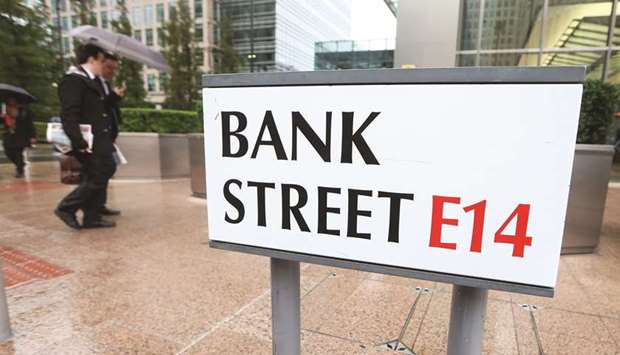Earnings season and Brexit are making for a lively combination. Many of the UK companies to have reported this month have mentioned the B-word in their statements, while retailer Bonmarche cited the impact of political uncertainty on customers as it went into administration.
Lender Barclays Plc, staffing company PageGroup Plc and car dealer Pendragon Plc have all bemoaned the effect on their business. But not everyone’s been complaining: Tech firm Softcat Plc reckons it’s seen no impact whatsoever.
“It’s an easy one-liner for companies at the moment,” said Andrew Millington, head of UK equities at Aberdeen Standard Investments, while acknowledging that Britain’s delayed withdrawal from the European Union has had an impact on large consumer purchases and business investment decisions. “So I wouldn’t immediately discount any mention of Brexit in a company statement.”
Here’s a roundup of what companies have been saying:
Banking
While Barclays’ third-quarter earnings beat estimates, the bank cautioned that macroeconomic uncertainty is making meeting some targets more challenging. On a post-results call on Friday, chief executive officer Jes Staley said the main driver of that comment was Brexit, and a different UK interest-rate environment to when those targets were set in 2017.
The bank is “obviously hoping to get the Brexit uncertainty behind us,” he said after reporting a 2% income decline for Barclays UK.
Rival Royal Bank of Scotland Group Plc reiterated its view on Thursday that Brexit has impacted business for both its retail and commercial units, sending its shares down 3.3%.
The lender had warned in August that large corporations are delaying financing, a claim described by Keefe Bruyette & Woods analyst Edward Firthas “sort of bizarre” given that corporate-sector loan growth is running at its highest level in 10 years. But Bloomberg Intelligence’s Jonathan Tyce expects data to show such growth slowed “aggressively” in September given the unsettled climate.
Consumer
Another retailer has fallen: Bonmarche went into administration last weekend, and while the Over 50s womenswear chain has been struggling for years, customer caution over Brexit was cited as a knockout blow.
The company isn’t alone among fashion retailers bemoaning Brexit: Ted Baker Plc warned of “weak consumer spending against a backdrop of Brexit and broader political and economic uncertainty,” sending shares down 40%.
Privately-held sandwich chain Pret A Manger said on October 10 that “UK consumers continue to be faced with inflationary pressures and political uncertainty aggravated by the potential of a no-deal Brexit.”
An index tracking British consumers’ optimism calculated by research group GfK appears to validate the sector’s concerns, falling deeper into negative territory in the years since the referendum.
Recruitment
PageGroup has mentioned Brexit jitters in almost every trading update it’s issued since the 2016 referendum. This month, the firm attributed a fall in profit to “heightened Brexit-related uncertainty now impacting candidate and client confidence at all levels.” Rival Robert Walters said market conditions had softened, with Brexit among several geopolitical events combining to create “a unique set of cumulative headwinds.” Both stocks slid after the statements.
The cloudy domestic climate, along with the US-China trade dispute, is “very clearly” hurting the recruitment sector, Panmure Gordon analyst Adrian Kearsey said by e-mail. The number of Britons in work declined for the first time since 2017, according to data this month.
Car dealers
Last Tuesday’s news that Pendragon had returned to an underlying pretax profit was welcomed by analysts after a profit warning in September that was attributed partly to the impact on customer confidence of Brexit uncertainty. The car dealer’s stock remains down 68% since the referendum despite rallying after last week’s update.
Meanwhile, this month’s results statement from Vertu Motors Plc pointed to increased stockpiling of vehicles by manufacturers in advance of the original March 29 Brexit deadline. And according to the Society of Motor Manufacturers and Traders lobby group, Britain’s car sales are lagging behind other major European markets.
Liberum analyst Sanjay Vidyarthi has a different take, saying that the weak pound – which has made European cars more expensive – has been a bigger issue than consumer confidence. “At the same time original equipment manufacturer incentives haven’t been as strong, and marketing spend in the UK is less than it used to be,” he said by phone.
Construction suppliers
Building merchants have complained of Brexit pressures for several years now, and a profit warning from Forterra Plc on Tuesday, issued in recognition of “the current macroeconomic uncertainty,” caused British brick-makers to tumble. The same day, Travis Perkins Plc shelved plans to sell its plumbing and heating business, citing “the current unprecedented level of uncertainty.”
Earlier this month, SIG Plc and Grafton Group Plc recorded one-day share-price drops of 16% and 10%, respectively, after profit warnings. SIG cited the political and macro-economic outlook for a deterioration in key construction markets, while Grafton reckons UK households have deferred home-improvement projects for the same reason.
Clarity on Brexit and a cut to stamp duty – as was speculated earlier in the year – would provide a boost to construction activity, “but uncertainty is clouding the near-term outlook,” Peel Hunt analysts including Clyde Lewis wrote in a note following Forterra’s update.
Tech
Not everyone blames Brexit. IT company Softcat said in Wednesday’s interim results statement that it hasn’t noticed any impact.
“Since the UK’s EU referendum in 2016, the directors do not believe the company has suffered any adverse effects from the Brexit process,” it said in a statement. “We are also well-prepared to cope with whatever the Brexit process may bring” said chief executive officer Graeme Watt.

Pedestrians pass a ‘Bank Street’ road sign in the Canary Wharf business, financial and shopping district in London (file). While Barclays’ third-quarter earnings beat estimates, the bank cautioned that macroeconomic uncertainty is making meeting some targets more challenging. On a post-results call on Friday, chief executive officer Jes Staley said the main driver of that comment was Brexit, and a different UK interest-rate environment to when those targets were set in 2017.
